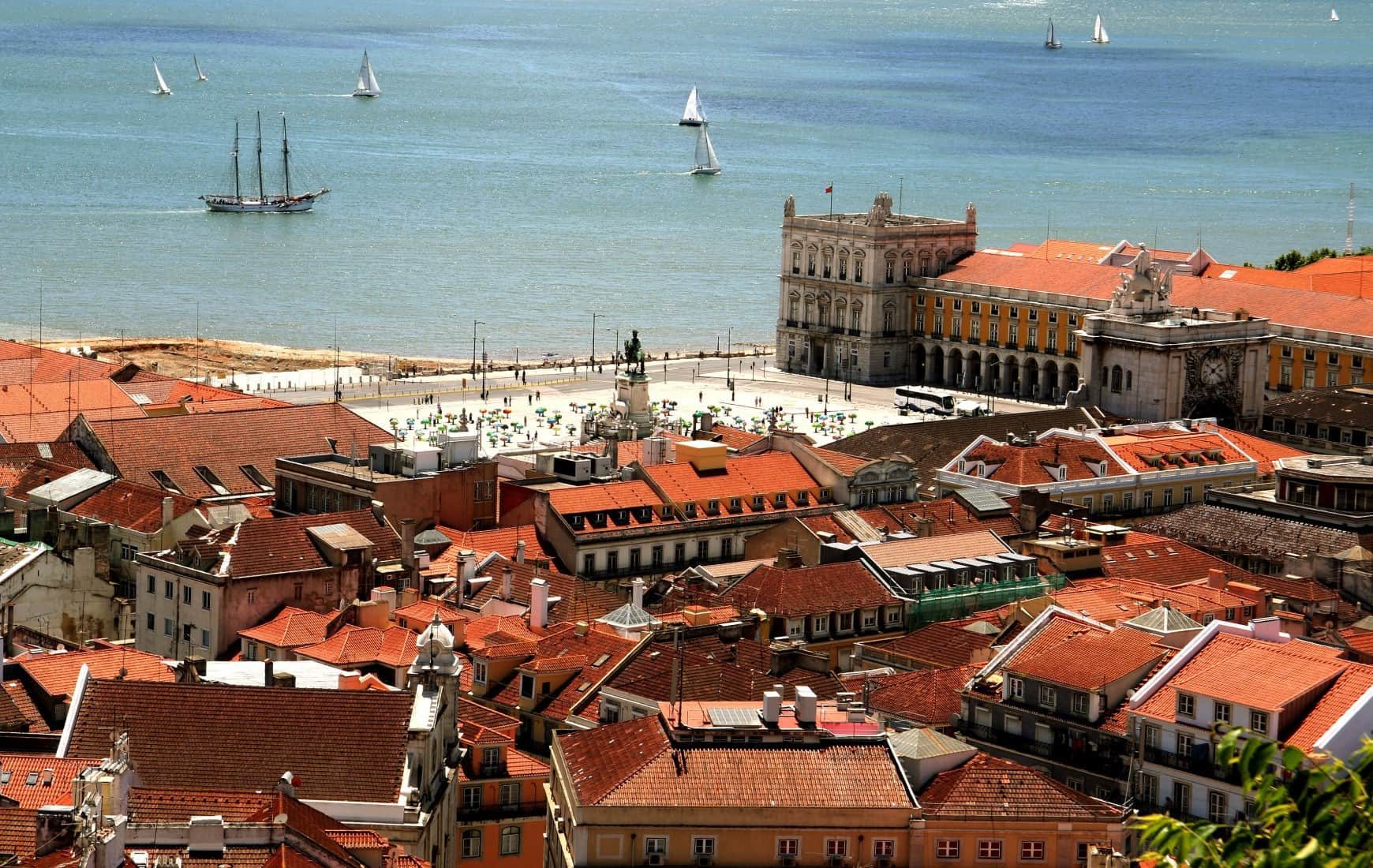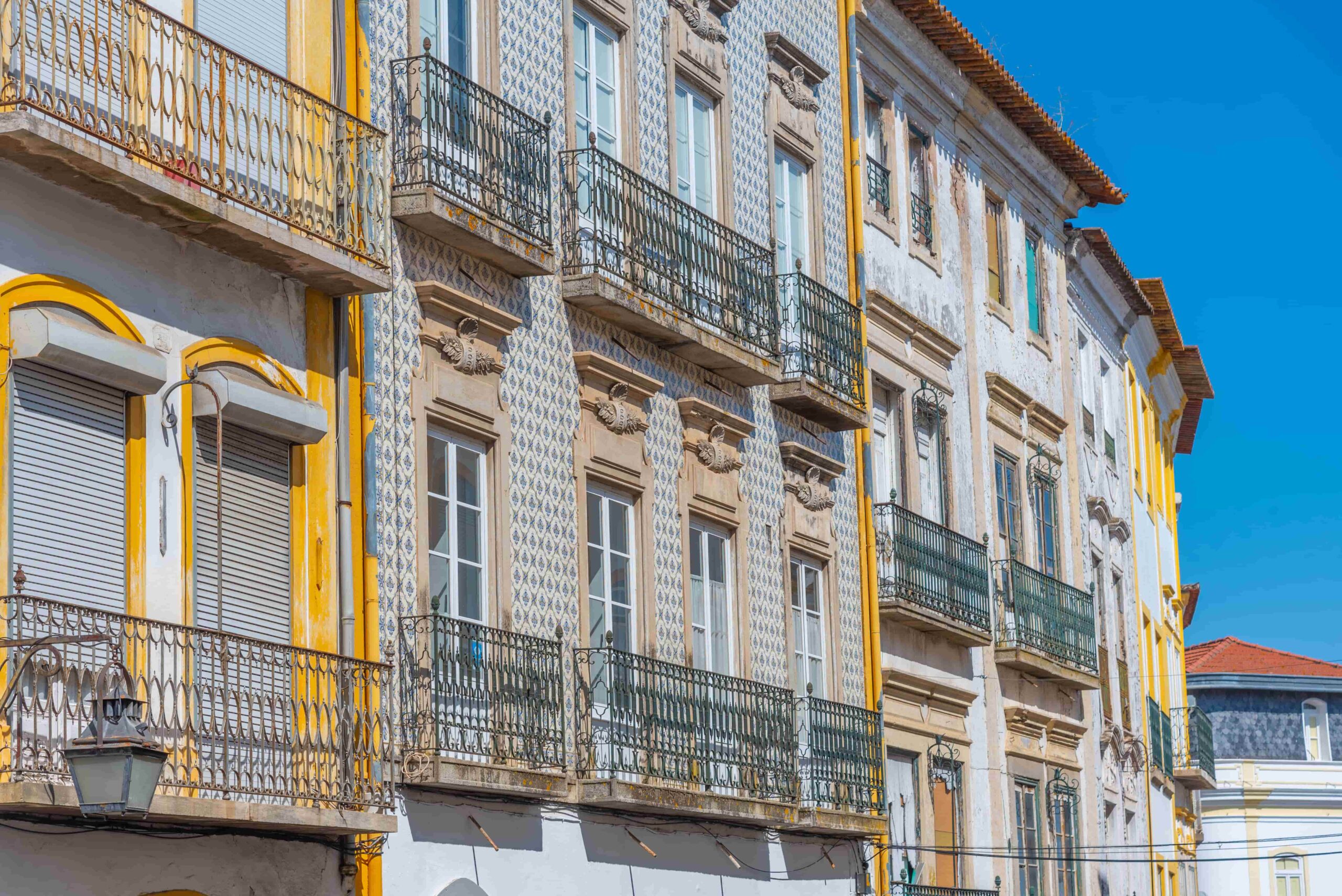
Portugal Digital Nomad Visa: The Definitive Guide
Portugal Rating from Citizen Remote
Overall
Internet Infrastructure
Country Stability
Cost of Living
Ease of Obtaining Visa
Taxes
Quick facts about Portugal

What Is Portugal Digital Nomad Visa?
Portugal Digital Nomad Visa refers to a few types of visas that allow remote workers to live and work in the country legally. These visas include the recently introduced nomad-targeting Temporary-Stay Visa, D7 Passive Income Visa, D2 Entrepreneur Visa, Portugal Golden Visa, and the regular Tourist Visa, which happens to be the Schengen.
Although the acquisition processes for all these visas are almost identical, the allowed lengths of stay and the specific documentation they require may vary depending on the visa type.
In this article, we’ll be focusing on the new digital nomad visa type called the Temporary-Stay Visa, which allows short-term residency and independent professional activity in Portugal. Read on to learn more about this type of Portugal self-employment visa.
What Is Portugal Digital Nomad Visa?
Portugal Digital Nomad Visa refers to a few types of visas that allow remote workers to live and work in the country legally. These visas include the recently introduced nomad-targeting Temporary-Stay Visa, D7 Passive Income Visa, D2 Entrepreneur Visa, Portugal Golden Visa, and the regular Tourist Visa, which happens to be the Schengen.
Although the acquisition processes for all these visas are almost identical, the allowed lengths of stay and the specific documentation they require may vary depending on the visa type.
In this article, we’ll be focusing on the new digital nomad visa type called the Temporary-Stay Visa, which allows short-term residency and independent professional activity in Portugal. Read on to learn more about this type of Portugal self-employment visa.
What Are the Benefits of Working in Portugal?
Portugal has been a hot spot for digital nomads and other remote workers for quite some time now. That’s because living and working in Portugal has many perks that appeal to foreigners. Find below some of the advantages that make Portugal an excellent base for digital nomads:
- Effortless travel among the EU countries
- Relatively low cost of living
- Great weather
- Reliable internet connection
- The abundance of coworking spaces
- Prosperous history and culture, and the vibrant lifestyle of Portugal
Types of Digital Nomad Visas in Portugal
There are a few types of visas that will allow you to live and work in Portugal as a digital nomad.
- 1. Temporary-Stay Visa
- 2. D7 Passive Income Visa
- 3. D2 Entrepreneur Visa
- 4. Portugal Golden Visa
- 5. Tourist Visa
Temporary Stay Visa
Specifically targeting digital nomads, the Temporary-Stay visa allows remote workers who earn at least €2,800 a month to live and work in Portugal for up to one year. This type of visa can be extended four times for one year, adding up to a maximum of 5 years. Portugal Digital Nomad Visa requires you to pay a 15% tax that is considerably lower than the standard Portuguese tax, which is 25% throughout the initial four years of your stay in the country. The process of obtaining a Temporary Stay Visa is the same as that of getting a D7 Visa, apart from the said incentives and requirements.
D7 Passive Income Visa
Although the primary target group of the D7 Passive Income Visa used to be retirees, D7 also proved to be another ideal type of Portugal remote worker visa for digital nomads. The D7 Visa is initially valid for up to 120 days, during which you need to appeal at SEF to get your residency permit. The extension of the D7 Visa also allows you to bring your dependent children and spouse to Portugal with you. However, to qualify for the said visa, you’re required to prove that you earn enough to support yourself and your dependents, and the source of the income should be outside of Portugal. The said income should amount to at least €8,460 annually, which is equivalent to the minimum salary in Portugal. If you’re bringing your family, you should demonstrate an extra €4,230 for your spouse and €2,538 for each dependent child.
D2 Entrepreneur Visa
The primary aim of the D2 Visa is to encourage entrepreneurs from non-EU countries to invest in Portugal. To qualify for the D2 Visa, applicants must either invest in an existing business in Portugal or prove that they have sufficient resources to establish a new one. Although there’s no minimum requirement as to the resources you must show, it’s in your best interest to demonstrate evidence that you have at least €5,000 available. Besides the proof of resources, you should also present a solid business plan that your investment will enhance the local economy and affect the local community positively. In addition to providing such evidence, you’re required to state your motivation for choosing Portugal as your base for conducting business.
Another requirement you must meet to qualify for the D2 Visa is to show proof that you have adequate financial means to support yourself and your dependents if there are any. The minimum amount required is €8,460 annually, which is the equivalent of the minimum Portuguese salary. Similar to the D7 Visa, D2 Visa is initially valid for 120 days, during which you must make an application to SEF for a residency permit, which will allow you to reside in Portugal for up to 5 years. Following the completion of this period of five years, you can apply for a permanent residency permit, which can later lead to Portuguese citizenship.
Portugal Golden Visa
Another program that may act as a Portugal freelance visa is the Portugal Golden Visa, which allows you to live and work in Portugal in return for a certain investment in the country. By holding a Golden Visa, you can keep your residency permit by spending only seven days per year in Portugal. Moreover, your dependents can also benefit from the program as an extension.
The investment options you can choose from to qualify for the Golden Visa are as follows:
Real estate investment:
- €500,000 in any type of real estate property
- €400,000 in any type of real estate property in a low-density area
- €350,000 in a property that’s at least 30 years old, with the obligation to renovate
- €280,000 in a low-density area property that’s at least 30 years old, with the obligation to renovate.
Other investment options:
- At least €500,000 in venture capital Portugal funds
- At least €1,5 million of capital investment
- Creating at least 10 full-time employment opportunities in a business you own or investing at least €500,000 in a local business and creating at least 5 full-time employment opportunities
- Donating at least €250,000 to the preservation of the Portuguese heritage
- Donating at least €500,000 to research and development in Portugal
You’re not obliged to pay Portuguese taxes when you hold a Golden Visa unless you voluntarily transfer your tax residency to Portugal.
Tourist Visa
For those who like to travel more frequently, a regular tourist visa may also be adequate to stay in Portugal as a digital nomad. If you’re a citizen/resident of the US, Australia, Japan, Canada, New Zealand, the UAE, or Brazil, you’re allowed to stay in Portugal for 90 days by obtaining a short-stay tourist visa without applying beforehand. If you’re not from one of these countries, on the other hand, you’ll probably need a Schengen Visa, which most commonly allows you to stay in Portugal for up to 90 days in a period of six months. However, there’s a Schengen visa option that’s valid for 5 years, which allows the holders to stay 90 days every 180 days. This type of visa is more suitable for nomads who travel a lot. If you want to bring your family members along, you’re required to apply for a separate visa for each individual.
To apply for a Schengen Visa, you’ll need to provide the following:
- Having provided an accurately filled-out visa application form
- A valid passport
- Two passport-style photos
- Evidence of accommodation
- Evidence of itinerary
- Travel health insurance that the coverage of which is at least €30,000
- Documents proving that you can support yourself during your stay
- Visa fee payment receipt

How to Choose The Right Visa Type for You
To make the right decision as to which visa type is right for you, it’s crucial to understand your needs. To have a better grasp of them, list your needs and search criteria.
Asking the following questions will be of great help as you do so:
- Are you willing to, or do you want to live in Portugal full-time?
- Do you have a passive income, if so, is it more than €1,000 a month?
- Are you working a remote job, earning you more than €2,800 a month?
- Are you interested in making a substantial investment in Portugal?
- Are you interested in starting a company in Portugal?
- Are you looking to get Portuguese residency/citizenship?
It is best to consult a law firm or an advisory firm to see what option would be the most optimal for you.
For the sake of consistency, we focused on the relatively new digital nomad visa type in Portugal named the “Temporary Stay Visa” in this article. Below, you will find the details about this visa type.
Portugal Digital Nomad Visa Requirements: Temporary-Stay Visa
There are certain requirements the applicants need to meet in order to become eligible for the Nomad Visa Portugal. These include the collection and submission of the required documents, payment of demanded fees and other costs, and completing the necessary steps.
Although the processes of getting all the visas mentioned in this article are more or less the same, there are some specific documentation requirements for the Temporary-Stay Visa.
Eligibility Criteria for the Temporary-Stay Visa
Find below the eligibility criteria that the Portugal self employment visa applicants are required to fulfill:
- Being a non-EU/EEA/Swiss citizen
- Having a monthly income of at least €2,800 from outside Portugal
- Having a clean criminal record
- Having proof of accommodation
- Getting a Portuguese NIF (tax number)
- Opening a Portuguese bank account prior to your residency application (within 120 days)
Nationality Requirements
Non-EU/EEA/Swiss citizens are eligible for a temporary-stay visa in Portugal; because citizens of the EU, EEA, and Switzerland are already allowed to enter and reside in Portugal visa-free. Therefore the Temporary-Stay Visa is offered only to those who are not citizens of these areas and wish to enter Portugal temporarily.
Getting a NIF
The NIF (Número de Identificação Fiscal) is a tax identification number issued by the Portuguese government to individuals and businesses. It's used to identify taxpayers and track tax payments. To obtain a NIF, individuals must submit a request to a Portuguese Tax Office or Citizen Bureau along with their personal identification documents. Businesses must also register with the tax authority and provide documentation such as articles of incorporation and proof of address. The NIF is required for various financial transactions in Portugal, including opening a bank account and registering for social security. It's crucial to have a NIF to comply with Portuguese tax laws and to facilitate financial transactions
Opening a Portuguese Bank Account
It's essential to have a bank account in Portugal when applying for residency. You can open an account in a Portuguese bank, an international bank that has branches in Portugal, or a digital bank that operates in Portugal. The requirements and process for opening an account may vary depending on the bank and the account type you want to open. However, you'll typically need to provide identification documents such as your passport, visa, and proof of your address in Portugal or your home country.
Proof of Income
When applying for a Temporary-Stay Visa, you must demonstrate that you have enough money to support yourself and any dependents from an income source that is not in Portugal. The required amount is equivalent to a minimum salary, which is €8,460 per year. If you are bringing your family along, you pay an extra €4,230 for your spouse and €2,538 for each dependent child.
Find below a list of documents that you can show to prove you’re self-sufficient:
- Employment contract detailing your income and last three months’ bank statements if you’re a remote worker
- Certificate of business registration and last three months’ bank statements if you’re self-employed
- Last three months’ bank statements and proof of significant savings if you’re a freelancer
Proof of Accommodation
The Temporary-Stay Visa application process requires you to demonstrate that you have a place to stay for the first 12 months of your stay in Portugal. You can submit documents such as a rental agreement, a reservation for a hotel or an Airbnb, or a letter from someone offering you accommodation. If you're unable to provide such proof, you may submit a letter explaining the reasons to the Embassy. This letter should also include evidence of accommodation for six months and your plan regarding finding a more permanent rental or purchasing property upon your arrival in Portugal. The final decision of whether to accept your application will be left to the discretion of the Embassy.
A Clean Criminal Record
A clean criminal record is one of the typical requirements that all countries demand as part of the process of getting a long-term stay visa. How you acquire this document may vary depending on your country of origin, but the certificate shouldn't be older than three months at the time of the application. If you've lived in another country within the last five years, you'll also need to provide a certificate from that country. The documents should be notarized with an apostille and translated by a certified translator if needed.
Minimum Stay Requirement
If you get a Temporary-Stay Visa, you’re required to spend at least 183 consecutive days in Portugal during the 2-year validity period of your visa.
Required Documents for Temporary Stay Visa
- The official application form for the Temporary Stay Visa
- A valid passport/Any other travel document
- Two recent and identical passport-style photos
- Evidence of accommodation
- Evidence of adequate means of self-support
- Permission for a criminal record check if the intended stay is to exceed 90 days (except for those under 16)
- Return travel ticket/Proof of booking travel arrangements with a clear return date, if the intended stay is to exceed 90 days
- Articles of Association/service rendering contract for acting as an independent worker
- Evidence of being covered by the National Health Service/Health insurance
- Documentation of registration within the tax authority
- Documentation of regular payment of social security during the tax exemption period
- Declaration for checking the requirements of the profession that’s subject to special qualifications–issued by the competent authority (if applicable)
Cover Letter
- The cover letter should include the following items:
- Personal information
- Your motivation in requesting temporary residency in Portugal
- Information about your ties to Portugal if there are any (family/friends, property, etc.)
- Your intentions as to how you’ll financially support yourself and your dependents during your stay in Portugal
- Listing an explanation of all document content that’s attached to your application

Related Articles
Steps for Portugal Digital Nomad Visa
The Portugal Digital Nomad Visa allows individuals to live and work in Portugal for up to one year. The steps for obtaining the visa include submitting an online application, providing proof of income, and attending an in-person appointment.
Collect all the required documents
Collect all the required documentation before your application. Keep in mind that you should get all the documents that a non-EU country issued officially authenticated by an Apostille from the relevant country to be used in another. Make sure you keep at least two copies of all documents because your residency application will require the same documents.
Fill out the Temporary-Stay Visa Application Form and write the cover letter
Fill out the application form thoroughly and accurately. The information on the application form should match the information that your supporting documents demonstrate. Write your cover letter with excellent attention, for it’s the first thing that your visa application assessor will evaluate. Try to be straightforward and include all the necessary details. Remember that all cover letters should be dated and signed by the applicant.
Submit the required documents
Submit your application and the supporting documents to the Portuguese Embassy and pay the required visa fee, which is approximately €180 per person.
Obtain your visa
The visa typically takes around 3 to 4 months to be processed. Once you get the approval, you can collect your visa along with your passport from your application location.
Enter Portugal
Upon receiving your visa, you can enter Portugal. Your visa will initially allow you to stay in Portugal for 120 days. At some point during this 120-day period, you need to set an appointment with the SEF to become a resident.
Make an appointment with SEF and register as a resident
Arrange your appointment with the SEF and register as a resident. To apply for residency, you need to show evidence that you have a NIF and an account in a Portuguese bank. For the residence application, you’re required to pay an additional €320.
Portugal Work Visa Fees
The Portugal Work Visa fee is a one-time payment of €75. This fee is non-refundable and must be paid at the time of application. It covers the processing of the visa application and is a required part of the application process. It is important to note that additional fees may apply, such as fees for obtaining a criminal record certificate or health insurance, and it is advisable to check with the Portuguese embassy or consulate for any additional fees and requirements.
FAQs
What is the Portugal Digital Nomad Visa?
The Portugal Digital Nomad Visa is a type of visa that allows non-EU citizens to live and work in Portugal. It’s designed for those who can carry out their work from anywhere in the world.
What is Portugal Freelance Visa?
Portugal Freelance Visa is a type of visa that allows non-European Union citizens to live and work as freelancers in Portugal. It's designed for individuals who want to provide services to clients in Portugal as independent contractors. To be eligible, applicants must have a guaranteed income and health insurance coverage. The visa is valid for one year and can be renewed.
What is the difference between the Portugal Digital Nomad Visa and the Tourist Visa?
The amount of time that the visa holder is allowed to stay in Portugal is what distinguishes a Portugal Digital Nomad Visa from a Portugal Tourist Visa. The tourist visa only allows the holder to stay in Portugal for up to 90 days, whereas you can stay in Portugal for a year or more by holding a Digital Nomad Visa Portugal. You can decide which visa to acquire depending on your needs and traveling frequency. Obtaining a tourist visa may be enough if you’re a nomad who moves around a lot. However, if you prefer to get the most out of your destinations and experience a country as if you’re a local or simply want to get comfy for a while, you may consider getting a work visa Portugal.
Which Type of Work Visa for Portugal is the Best Suitable for Digital Nomads?
The type of work visa for Portugal that’s most suitable for digital nomads depends on the individual's specific needs, nationality, and purpose of staying in Portugal. The visa options include the Temporary-Stay Visa, the D7 Passive Income Visa, the Golden Visa for investors, or the D2 Visa for entrepreneurs. It's recommended to consult with a professional to determine the most suitable option for your situation.
How can I get freelance visa in Portugal?
To obtain a freelance visa in Portugal, you'll need to meet certain requirements and follow specific steps. The key requirements to get a Portugal work permit include having a valid passport, proof of sufficient income or financial means, and a valid health insurance plan. The specific steps to apply for a freelance visa Portugal may vary depending on your country of origin and other factors. However, typically, you will need to complete and submit an application form to the Portuguese consulate or embassy in your home country, along with any required documentation. You may also need to attend an in-person interview and/or provide biometric information. It's advisable to check the specific requirements and steps with the Portuguese consulate or embassy in your home country and to seek guidance from legal professionals.
What are the Portugal Digital Nomad Visa requirements?
The Portugal Digital Nomad Visa, also known as the Temporary Stay Visa, requires the following:
- Proof of income: A minimum monthly income of €2800 to demonstrate financial sustainability.
- Health insurance: Evidence of valid health insurance coverage for the entire period of stay in Portugal.
- Accommodation: Proof of secure and stable accommodation in Portugal.
- Criminal record certificate: A certificate of good conduct from the country of origin or the country of residence.
- Passport: A valid passport with at least 6 months remaining validity.
- Digital nomad work plan: A plan outlining the digital nomad work activities in Portugal, including the services to be provided and the clients to be serviced.
- Proof of means of support: Evidence of sufficient funds to cover the cost of living in Portugal.
How do I become a freelancer in Portugal?
- Obtaining a freelance visa: This will typically involve completing and submitting an application form to the Portuguese consulate or embassy in your home country by attaching any other required documentation to it.
- Registering your business: As a freelancer, you'll need to register your business with the Portuguese government. To do so, you're required to deliver an application form and all the other necessary documents to the local tax office.
- Obtaining any necessary licenses or permits: Depending on the type of work you'll be doing as a freelancer, you may need to hold specific licenses or permits. For example, if you'll be providing professional services, you may need to obtain a professional license.
- Getting a NIF and setting up a business bank account: You will need to set up a business bank account in your name for financial transactions.
- Keeping records of your income and expenses: As a freelancer, you'll be responsible for keeping a record of your income and expenses for tax purposes.
Are there any restrictions on the type of work I can do while on a Digital Nomad visa?
Digital Nomad Visa Portugal allows the holder to work remotely while in Portugal, but it does not allow for paid employment or self-employment in Portugal. Additionally, the visa holder must not undertake any activities that are detrimental to the Portuguese economy.
Can I move to Portugal as a freelancer?
Yes, it is possible to move to Portugal as a freelancer. You’ll need to obtain a visa that’ll allow you to reside and work in Portugal: for instance, you can apply for the newly introduced Temporary-Stay Visa, which is a special type of visa issued for digital nomads, freelancers, and other remote workers. You can also opt for D2 Visa, D7 Visa, Golden Visa, or Tourist Visa, depending on your needs and criteria.
How do I get a digital nomad visa for Portugal?
To get a digital nomad visa for Portugal, first, you need to prove your financial independence by demonstrating evidence that you earn €2800 monthly, in addition to providing the necessary documents and a filled-out Application Form. After completing the Portugal Digital Nomad Visa application by following these steps, you’re required to make an appointment with SEF and attend it. Upon getting your self employed visa Portugal, you’ll need to register your business.
